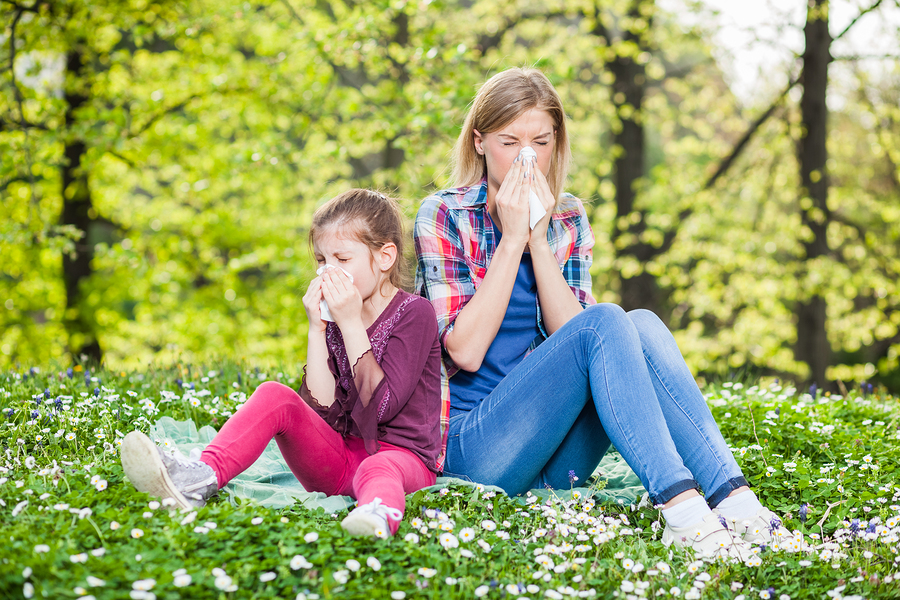Antihistamine and allergy shots are not the only way to battle seasonal allergies. If allergy symptoms – such as a runny nose, watery eyes and congestion – are wreaking havoc in your daily life, eating a healthy diet full of fruits and vegetables can help reduce the symptoms. Here is a list of foods that fight allergies.
Omega-3s
DHA and EPA, two types of omega-3 fatty acids, help to ease allergy symptoms. Eating foods such as mackerel, salmon, trout, tuna, bluefish and herring help facilitate the production of EPA and DHA in your body. However, be careful of fish with high-mercury levels. Choose wild caught not farmed, whenever possible.
For a plant-based source, tree nuts such as walnuts and flaxseeds also contain omega-3 fatty acids. Flaxseeds also contain selenium, a mineral that can help reduce allergy symptoms.
Quercetin
Quercetin, a flavonoid found in some foods, helps reduce the inflammation associated with allergies. It stabilizes mast cells, thus preventing immune cells from releasing histamines or an allergic response.
Apples, onions, peppers, berries, cabbage, cauliflower, and parsley all contain quercetin. Tea, especially green tea, also contains quercetin and acts as a natural antihistamine. Drink a morning cup of hot tea to help prevent morning allergy symptoms.
Magnesium
Magnesium is a bronchodilator and antihistamine, which also soothes muscles of the bronchial tubes and aid in lung function. Rich in magnesium, almonds, cashews, soybeans, wheat bran, kelp, and dark chocolate are all excellent foods for allergy relief.
Vitamin C
Vitamin C inhibits inflammatory cells from releasing histamine, thus reducing allergy symptoms. It also counteracts the inflammatory effects of free radicals. Oranges, red peppers, strawberries, apples, and watermelon are all vitamin-c rich foods to include in your diet.
Spices
Spices such as anise, fennel, horseradish, hot mustard all act as natural decongestants. They all reduce allergy symptoms by stimulating the mucosal cilia and breaking up congestion.
Other spices, such as turmeric, is a powerful anti-inflammatory food. This brightly colored spice is commonly used in native Indian curry and dishes.
Herbs
Rosemary, shiso and sage have antioxidant and inflammatory properties to relieve allergy symptoms. Rosemary is high in rosmarinic acid, which treats allergies because of its antioxidant properties. It also helps to clear up your wheeze and treat poor digestion and appetite, joint pain and sluggish circulation.
Shiso is predominately used in Asian medicine and cuisine. It is especially effective against seafood allergies and bronchial asthma. Sage is an excellent source for sore throats, coughs and colds.
Probiotics
Probiotics are healthy bacteria that live in your gut and help treat seasonal allergies. Fermented foods such as sauerkraut and kimchi are good sources of probiotics. Yogurts that say live cultures on the label are also good sources.
Other sources of probiotics typically list lactobacillus or bifidobcterium on the labels. These mimic bacteria found in your digestive tract.
Bromelain
Derived from pineapples, bromelain helps soothe and relax tense, inflamed muscles and connective tissue. It is widely used to treat a wide range of health problems such as allergies, asthma, autoimmune diseases, sinus infections, and arthritis and joint pain.
Other Considerations
While fruits and vegetables are recommended to reduce allergy symptoms, it is recommended to not eat raw foods at the height of allergy season. During this time, raw apples or pesticides on lettuce may bother your allergies.
It is also recommended to avoid spicy foods when pollen counts are high. Spicy foods trigger the production of histamine that act up when it’s added to the histamine produced by seasonal allergies.
Schedule a Consultation
If you have allergies, it is important to seek out foods that fight allergies as well as seek the right medical help. An allergist/immunologist is a specialist in the diagnosis and treatment of allergies, asthma and other diseases of the immune system. Testing done by allergist can give you precise information about what your child is and is not allergic to. If you are allergic to any substances, you and your allergist can develop a treatment plan to manage or even get rid of your symptoms.
To get you started, discuss and review your treatment options in order find the perfect option for you. Schedule an appointment with Dr. Shukla today, for treatment options and more on the foods that fight allergies.

